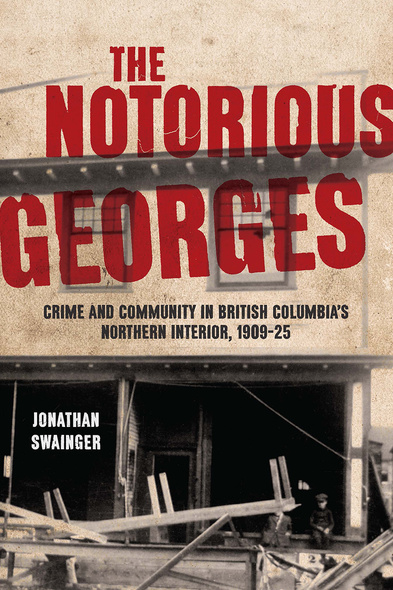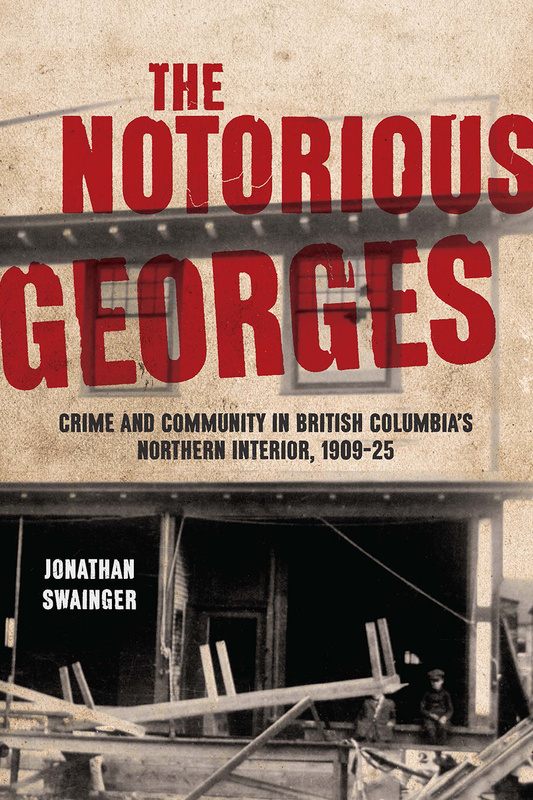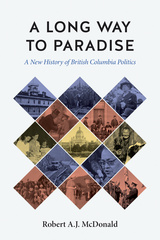
The Notorious Georges
Crime and Community in British Columbia's Northern Interior, 1905–25
Boozy and boisterous. The Georges – the communities of South Fort George and Fort George that ultimately became Prince George – have had a seedy reputation since before the First World War, branded Canada’s “most dangerous city” more than once. Is Prince George really such a bad lad?
The Notorious Georges takes another look, exploring how the local pursuit of respectability collided with caricatures of a riotously ill-mannered settlement frontier in its early years. Anxious that the Georges were being overlooked by the provincial government and venture capitalists, municipal leaders blamed Indigenous and mixed-heritage people, non-preferred immigrants, and transient laborers for local crime. Jonathan Swainger combs through police and legal records, government publications, and media commentary to demonstrate that the reputation was not only exaggerated but also unfair. Repeatedly cast as the bad apple, there was actually little to distinguish the Georges from the rest of a province that was admittedly a truculent place before the 1930s. And “respectable” white residents were responsible for the lion’s share of the disorder.
This lively account ultimately tells us about more than a particular community’s identity. It also sheds light on small-town disaffection and unease with a diminished place in modern Canada.
Readers interested in the history of the Canadian West, and in particular crime, social reform, and community history, will find this a fascinating and accessible exploration of the northern BC interior. It will also reach scholars and students of legal, social, political, small-town/urban, race, and Indigenous history, political science, anthropology, sociology, and criminology.
Awards
- 2024, Commended - Lieutenant Governor’s Medal for Historical Writing, BC Historical Federation
- 2024, Shortlisted - Basil Stuart-Stubbs Book Prize
- 2024, Shortlisted - W. Wesley Pue Book Prize, Canadian Law and Society Association/Association canadienne droit et société
Swainger writes for a broad audience, seeking readers not just in academia, but also those generally interested in local, BC, crime, or policing history.
It’s quite a story and quite a complicated one. Dr. Swainger has done a masterful job organizing a mountain of material into a coherent and very interesting saga
Swainger’s book provides a fascinating look at the process of community-building in Prince George, making plain the difficulty of achieving social cohesion among a diverse – and often divided – population, and realizing political stability and a functioning system for administering justice.
The Notorious Georges contributes greatly to criminal justice history as well as to the history of BC – and does it with a sense of humour.
Jonathan Swainger was the first academic hire at the University of Northern British Columbia and has spent his career at the campuses in Terrace, Fort St. John, and Prince George. One of the university’s founding mandates was to produce the histories of northern British Columbia and, in that vein, he has published articles on the Peace River region and on a post–Second World War juvenile delinquency panic in Prince George, as well as Aspiration: A History of the University of Northern British Columbia, a book-length account of the university that won the Jeanne Clarke local history award in 2017.
Introduction: Anxious at the Very Gates of Hell
1 Establishing the Georges and the Birth of a Bad Reputation
2 The British Columbia Provincial Police, Regulatory Policing, and Keeping the Peace
3 City Governance and the Prince George City Police
4 Holding Court in the Georges
5 Sensations, Front-Page Crime, and Community Identity
Epilogue: That Prince George Business
Notes; Bibliography; Index













